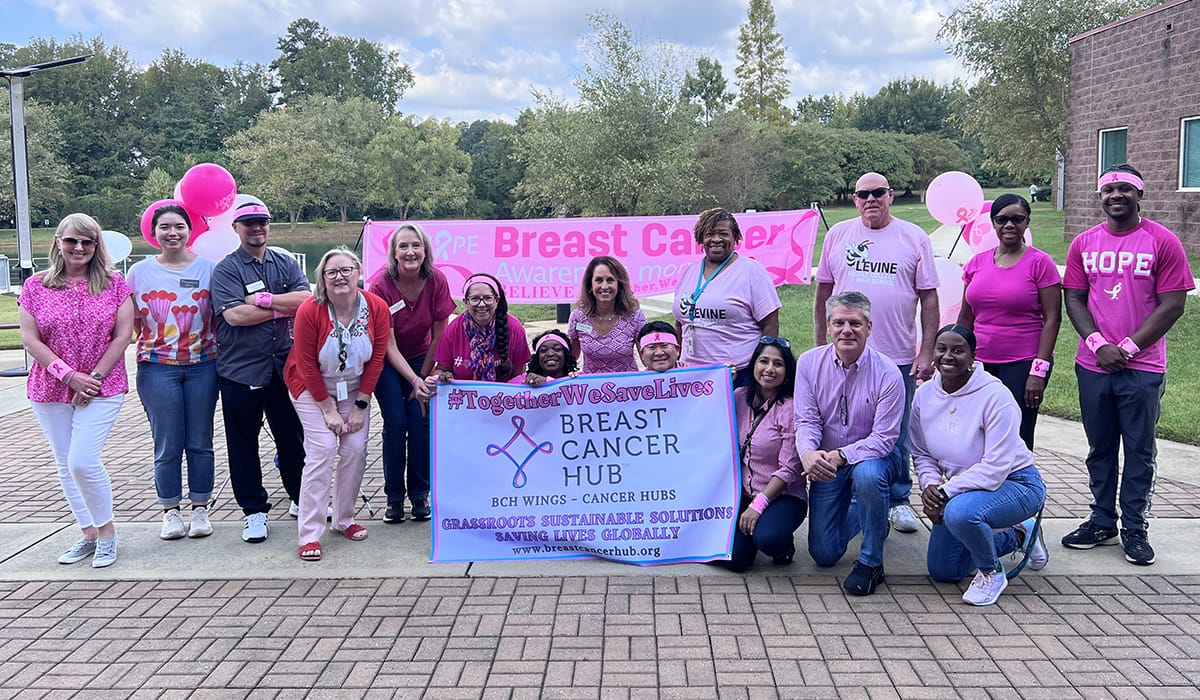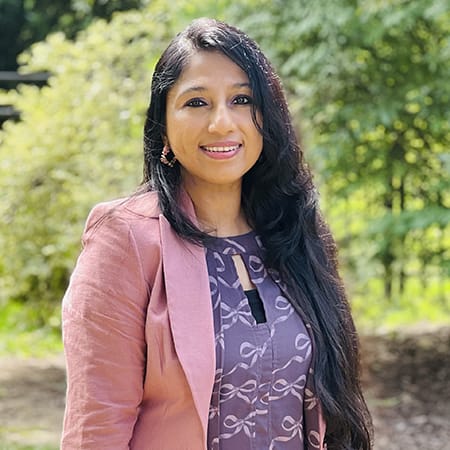Researcher and Nonprofit Founder Is a Beacon of Hope in the Fight Against Breast Cancer

Meet Daily Point of Light Award honoree Dr. Lopamudra Das Roy. Read her story, and nominate an outstanding volunteer or family as a Daily Point of Light.
Dr. Lopamudra Das Roy’s transition from a distinguished cancer research professor to the full-time founder and president of Breast Cancer Hub (BCH) marks a significant shift in her life’s mission. Her decision to resign from the University of North Carolina at Charlotte in 2017 to dedicate herself to BCH, a GuideStar Platinum Certified, top-rated 501(c)(3) nonprofit organization, demonstrates her unwavering commitment to making sustainable, impactful changes in the fight against breast cancer and all types of cancer globally.
Working primarily in the U.S., Asia, Africa, Turkey and globally through her hybrid model, Dr. Das Roy’s initiatives extend far beyond her home base of North Carolina. Her work involves collaborating with educational institutes, diverse ethnic groups, fellow NGOs, healthcare centers, companies, shelters, refugees and immigrant communities. She hosts powerful workshops and seminars, community awareness outreaches and offers tailored creative messaging and resources. Her commitment to providing scientific medical guidance to each suspicious case or cancer patient is a testament to her dedication.
Dr. Das Roy’s approach is deeply personal. She provides analysis of cancer diagnoses and treatment, assisting patients and caregivers in navigating the complex journey of cancer. This includes supporting the uninsured population in North Carolina, connecting them with vital resources. Her support groups, involving patients, survivors, oncologists, nurses and caregivers from across the U.S., India, Africa and other countries, foster emotional bonding and shared expertise.
Dr. Das Roy also involves students in her mission, inspiring them to create handcrafted cards for cancer patients. These cards, along with the items made by the BCH team, are delivered to local hospitals, bringing joy and comfort to those undergoing treatment.
Read on to find out more about Dr. Das Roy’s inspiring journey.
Tell us about your volunteer role.
I’m a cancer professor by profession, but in 2017 I resigned and started Breast Cancer Hub as a full-time, pro bono volunteer organization. So, it’s humanitarian work with 100% free services. Its inception was primarily because over the years, I realized how so many lives are taken to breast cancer and also other types of cancer due to taboo, ignorance and lack of awareness leading to late detection, lack of access to healthcare facilities, proper diagnosis and treatment management.
All this has motivated me to start the organization, which is all volunteer work. We primarily work in the U.S., India, Turkey, Africa and then globally through a hybrid model.

Why is this issue so important to you?
My family on my maternal side was affected with cancers of various types – my grandmother passed away from cancer. My father was a pediatrician, and he always spoke to the babies’ moms about breast milk. When I was 12 years old, one of my friend’s mothers passed away. At her funeral, when I went, no one wanted to discuss the cause of death. I was always a curious child, and when someone mentioned she had passed from cancer, I asked where. Her best friend didn’t want to say it aloud. She whispered, “breast cancer” in a very hush-hush way.
At that point, I realized there was a taboo that exists with the word “breast,” and it affected me so much. This was the type of respect we were extending to a mother – that we couldn’t even discuss the disease that cost her life. So, on the one hand, in my household, we were talking about it, and outside of my house, there was this taboo. I thought, if breast milk is so important and we are openly talking to mothers about it, why wouldn’t a woman want to speak about something going wrong in this same part of the body?
Where I’m from in India, cancer became a household name and often meant a death sentence. In the U.S., I was a scientist-reviewer for the Department of Defense Breast Cancer Research Program, and I would meet breast cancer fighters and advocates who were diagnosed as stage 4, even in the United States, because the mammograms had missed their cancer. The next year, when I would go back, these same people wouldn’t be there. It would just be her obituary. So, this became a burning issue for me. I was in the lab as a principal investigator, having grants from everywhere, and I felt that we were not striving toward fundamental changes that could really help save lives.
Providing simple solutions at a grassroots level and really tapping into the community – that’s where we could make a change. So, one day I decided, as I thought about my career, that I needed to do something that would make a change. It was like a calling from inside to start the nonprofit. And for me, “nonprofit” has to be real nonprofit – 100% volunteering. It’s not just about spreading awareness – it’s about end-to-end care.
What are your long-term plans or goals for the organization?
We are trying to spread awareness about male breast cancer, which is why, in our logo, we have a touch of blue.
I live in Charlotte, North Carolina, and we’ve already started tapping into some of the underserved areas here. Focusing on different ethnicities, shelter communities, immigrant populations, the Black community and Hispanic community. There are needs here for awareness and education, so I want to expand that outreach throughout the U.S. through our ambassadors.
In the developing world, we’d like to adopt more villages. We currently have adopted around 20 villages in India. In Africa, we’re often working with the patients. So, we want to find ways to expand more in these developing regions and how we can help more people with our grassroots solutions. As we expand our work more and more, we want to get involved in untapped areas that may otherwise have cancers go undetected.
What’s been the most rewarding part of your work?
It’s not the awards, but rather the smiles and the hugs from people whose lives were saved. All across the U.S. People attended my sessions and learned about mammograms missing their cancer. Men getting detected because we are one of the first to develop a screening process for men. People telling me that our work saved their lives – hearing that is my greatest reward. Even in the developing world, when they’d just give me a hug. Bringing smiles to the families. These are my biggest achievements.
Why is it important for people to get involved with the causes they care about?
I feel that if you really want to work for a cause, motivation should come from within. Students all across the U.S. reach out to me because they want to volunteer. I tell them, “Please do not come to me if your parents are forcing you to do this.” I want them to feel for the cause. I know they need volunteering for college applications, but I want them to get involved in a meaningful way. Become thought leaders. We can support all the organizations, but a volunteer role must come from the heart.
Any advice for people who want to start volunteering?
One day, we all have to leave, but what we leave behind is not our fame or name, but the impact on the lives we touch. This effort is typically selfless at first – I did not get immediate rewards when I started, and now I have many grants and publications. So, if someone wants to gain that experience, I’d say to count the blessings, not the material aspects of the work.
What do you want people to know about taking charge of their own health in regards to breast cancer screening and prevention?
Early detection is the key to saving lives. This starts with a screening protocol. In the case of breast cancer, screenings start after the age of 40. Screening means that there are no concerns, and so anyone 40 or over should go for a screening mammogram each year. But mammograms may also miss cancer. So now I’m telling everyone to opt for 3D mammograms, which uses higher-resolution technology. These can catch more in the way of denseness concerns.
Additionally, young people – women, men or any other gender – can get breast cancer. So, we have to go for clinical breast exams from early on. That means doctors or healthcare professionals should be checking our breasts at our exams. Very importantly, we’ve developed breast exam cards, for the first time, for both her and him. We have these available in 24 languages. Leverage our resources. Start from the age of 17 or 18 and complete this self-exam every month. Everything is mentioned on the card, including how to do this. We have to be able to understand the look and feel of our breasts to detect any abnormality. That’s applicable for all genders and ages.
For those who are at high risk for breast cancer, meaning people with a family history of it, they should go for screening mammograms earlier than the recommended age of 30. There’s a lot of resistance, even in a very advanced U.S., to screenings. I have patients reach out to me at very advanced stages of cancer solely because of the resistance to the healthcare system that they’ve had or grew up with. So, these are ways we can take charge of our health – to break the breast taboo and the cancer taboo and go for our screenings.
Do you want to make a difference in your community like Dr. Lopamudra? Find local volunteer opportunities.
